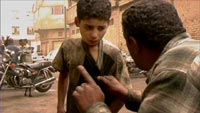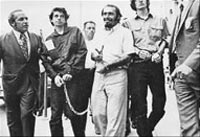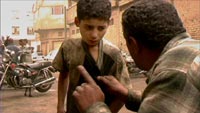In his 1996 novel In the Beauty of the Lilies, John Updike depicts several characters who struggle with the tension between religious faith and a love for movies. American culture, Updike suggests, now seeks from film the things it used to find in religion: transcendence, moral instruction, comfort and a sense of order—not to mention the simple act of coming together in a large room to witness a light shining in the darkness.
If he’s even partially right about that, then Christians who want to engage culture can scarcely afford to ignore the movies. Indeed, during the decade since Updike’s book was published, the number of voices offering a “Christian perspective on film” has grown dramatically.
But culture extends beyond popular culture, and the world of movies extends beyond the multiplex. The frontiers of a Christian response to the movies can be found in places like Seattle, where an unusual documentary-film festival seeks to focus viewers’ attention on human rights and social-justice issues while addressing those issues with a Christian voice.
Founded in 2006, the Film, Faith, and Justice festival recently concluded its second annual event. Last year’s screenings took place in a somewhat cramped space above the cafeteria at Seattle Pacific University, a liberal-arts school associated with the Free Methodist denomination. At this year’s venue—a spacious, theatre-style lecture hall at the University of Washington—FF&J nearly doubled its attendance. Students and professors rubbed shoulders with pastors, professionals, activists, cinephiles and international aid workers—and gave their attention in equal measure to films, lectures and panel presentations.
And there wasn’t even a whiff of popcorn.
Engaging the issues
Film festivals are everywhere these days, but most of them don’t intersperse the films with talks by a theologian pondering the possible connections between religion and violence, or by a circus performer exploring the notion of radical Christian community. Likewise, academic conferences on human rights issues are a dime a dozen, but few of them also feature a full slate of films that bring those issues to life simply by pointing a camera at them—sometimes without even a word of lecturing or polemicizing.
Film, Faith, and Justice brings together these two very different types of events. Thanks to the hybridization, lecture topics can move between academic abstraction and vivid cinematic description, and themes in a film can provide topics for a lively panel discussion, to help viewers process what they’ve just seen.

“As we dialogue for a night, we’re pointing at something that goes a lot deeper than just getting up and leaving after the end credits,” says festival director Chris Keller. “I think we’ve stumbled on a pretty important way of engaging these issues.”
Keller, 30, is a psychotherapist and editor in chief of The Other Journal, an online theological quarterly. Most of the films he screens are culled from a larger group selected by the organization Human Rights Watch for itsannual festival. When the opportunity arose to acquire screening rights for the Human Rights Watch films in Seattle, Keller and his colleagues seized it. “We start with the films we like,” says Keller, “and then consider how they fit together thematically.”
But by themselves, Keller notes, most of the films lack an explicit faith-based perspective—so he invites Christian academics and speakers to provide one. “Christian faith has a lot to offer on these issues,” says Keller. “The Judeo-Christian heritage came up with the whole idea of human rights.”
A different kind of doc
Documentaries aren’t entirely foreign to the average moviegoer. A small but growing number find their way into mainstream cinemas each year. Stylistically, such films seem to fall into two categories: quiet, narrative fare about kids and animals (Born into Brothels, March of the Penguins, The Story of the Weeping Camel), and brash, assertive political and social works like Michael Moore’s Fahrenheit 9/11, Morgan Spurlock’s Super Size Me and Al Gore’s An Inconvenient Truth—each a heady mix of data, opinion and footage, presented by a narrator who more or less tells the audience what to think.
But the works screened at Film, Faith, and Justice don’t quite fit either category. Although they deal with hard-hitting social issues, most of these films maintain strong narratives, show stylistic restraint and keep the filmmakers behind the camera, leaving viewers to draw their own conclusions. “I think all documentaries have an angle,” says Keller, “even if they’re striving for neutrality. But there’s more of an openness to the films that we choose, so that people who see them can come away with different impressions. They’re thought provoking, but they’re not trying to run you down with certain ideologies.”
The films he’s chosen put human faces on events and concepts that are too often discussed and understood only via abstractions and sound bites—and serve as proof that film can have an emotional impact without being emotionally manipulative. Rather than a stream of statistics, viewers come away from the festival with images like these:
- An 11-year-old Iraqi boy works in a Baghdad machine shop while harboring dreams of being a pilot.
- Farmers in Ethiopia’s Yergacheffe region gather to pray for better coffee prices.
- A Cambodian painter returns to the former schoolhouse where he was imprisoned by the Khmer Rouge and confronts some of the men who guarded, tortured and killed prisoners there.
When viewers start to relate to film subjects—to see them as people just like us—then our experience of the film starts to move beyond entertainment, even beyond information, says Dr. Roy Barsness, professor of counseling psychology at Seattle’s Mars Hill Graduate School, who led one of the FF&J panel discussions.

“The more we are removed from stories of other people’s lives, the more we make up a story about their lives. When we do that, we distort their lives, and often create them as different or as ‘other,'” says Barsness. “The moment we begin to see each other as more common than different, it becomes much more difficult to marginalize the other.”
For Barsness, the festival’s emphasis on narrative films with strong human interest is a sign of its Christian underpinnings. “I’m thinking of Jesus as a storyteller, trying to make meaning through story and through his willingness to listen,” he says. “Remember the story of Jesus and the adulterous woman [John 8]. He didn’t come with condemnation, doctrine or dogma, he came with a narrative.”
Adds Keller: “The exercise of sitting down and watching a movie, and following people through that exercise—it does something for us. We probably aren’t going to think about it in any other context. It’s a holy exercise, a healing exercise. We don’t want to remember or consider traumatic events, but it’s good for us, and we’re unable to heal without it.”
Humbled and moved
John Updike may have been on to something about the spiritual dimension of movies, but it’s safe to say he envisioned nothing as challenging or as profoundly Christian as Film, Faith, and Justice. Just as Jesus called his disciples away from their occupations, a festival like this one calls filmgoers to move past entertainment, familiarity and comfort, to consider deeper issues.
“We want this weekend to have an impact on people,” says Keller. “Some people I know have decided to change their buying practices; others have decided to sponsor a refugee family with their church group. But we’re also interested in providing a space where those who attend Film, Faith and Justice will be challenged on a heart level, by experiencing life and suffering in other countries, other classes, other circumstances, and be humbled and moved out of the arrogance that many of us have as North Americans. We want Christians and people of faith to take international human rights issues more seriously, and those who are not people of faith to consider what the Christian tradition has to offer modern-day human rights crises such as torture, global poverty, human trafficking and immigration.”
To that end, Keller invites representatives of Human Rights Watch, World Relief and other organizations to hand out literature and recruit new members at the festival. But it isn’t a hard sell. The belief that art can change the world has led to a lot of art that tries too hard, and Keller prefers to let Film, Faith, and Justice attendees reach their own conclusions in their own time.
“My Evangelical heritage has taught me that change starts from within,” Keller says. “This event invites us to walk with and be impacted by those who are living through genocide, extreme poverty and oppression. Some will leave the event and change how they live and how they believe, maybe sign up for feeding the homeless at one of the advocacy tables at our event. Others will leave Film, Faith, and Justice and be annoyed and reject the invitation for now. Either way, we’re sowing seeds, and that’s what we feel is our job.”
Martin Stillion, a journalist, editor, musician and man about town, lives in Edmonds, Washington, with his wife, Sarah, and son, Sebastian. He can be found playing the violin at Seattle’s Bethany Presbyterian Church.
Copyright © 2007 Christianity Today. Click for reprint information.











